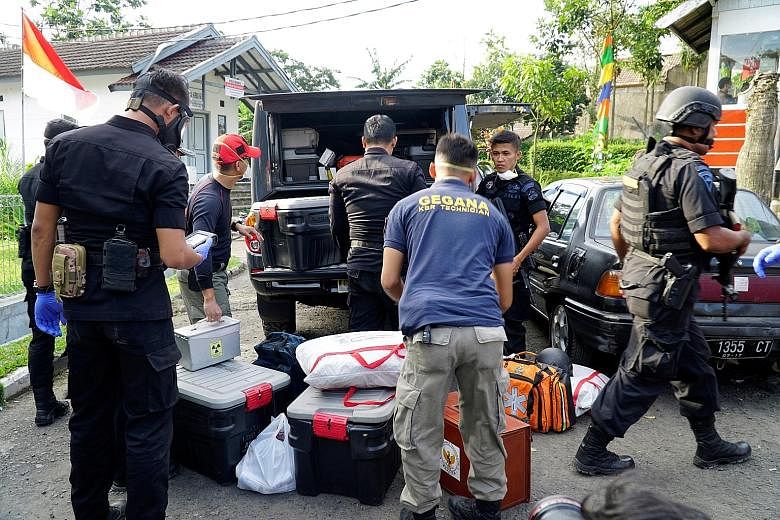JAKARTA • Indonesian militants planned to detonate a radioactive "dirty bomb", security sources said, highlighting the rising ambitions of extremists to wreak destruction in the world's largest Muslim-majority nation. But experts cast doubt on the militants' expertise, equipment and chances of success.
The plot was foiled when the police raided homes and arrested five suspects in Bandung, West Java, last week, the sources with direct knowledge of the plot said.
After the raids, the police spoke of a plan to explode a "chemical" bomb but provided no other details.
The plot comes as Indonesia grapples with an influx of militants deported from other countries and the fallout from terror group Islamic State in Iraq and Syria (ISIS)-led siege in the southern Philippines city of Marawi that regional leaders and analysts worry has energised militants across South-east Asia.
The three counter-terrorism sources, speaking on condition of anonymity, said the militants had hoped to transform low-grade radioactive thorium 232 into deadly uranium 233. The highly radioactive uranium would be combined with the powerful homemade explosive triacetone triperoxide (TATP) to create a "nuclear bomb", according to an instruction manual used by the militants. In fact, the device would be, at best, a radiological dispersal device or "dirty bomb" that could spray radioactive material when the conventional bomb exploded.
A spokesman for Indonesia's national police, Inspector-General Setyo Wasisto, declined to confirm or deny the plot to construct the device, but said it would have been more potent than the two bombs made from TATP that killed three police officers in Indonesia's capital Jakarta in May.
"If this bomb had been finished, it would have had a more destructive impact than the bomb made from 'Mother of Satan'," he said, using the nickname for TATP. "It could burn anything and make it hard for people to breathe."
Indonesia has suffered a series of mostly small attacks by extremists over the past 18 months, although the police have disrupted many more.
Indonesian terrorism analyst Rakyan Adibrata fears that militants have been inspired by the events in Marawi, where ISIS fighters continue to occupy part of the city despite a three-month offensive by Philippine forces to retake it.
"They don't have the ability to occupy a city like what has happened in Marawi, but they want to do something big that pleases their bosses in ISIS," said Mr Adibrata.
A radiological bombing could fit the bill, although Mr Adibrata said that it was highly unlikely that the Bandung cell had either "the equipment or the knowledge" to succeed.
Most of Indonesia's recent attacks have involved members of Jamaah Ansharut Daulah (JAD), a pro-ISIS alliance of Indonesian militants. Many have been directed from Syria by an Indonesian national and JAD leader Bahrun Naim, according to the police.
The police also said the suspected Bandung plotters were members of JAD and were considering targets like the presidential palace in Jakarta, and police headquarters in Bandung and the capital.
Two of the five suspects are Indonesian migrant workers deported from Singapore and Hong Kong this year for posting radical Islamist material on social media.
They spent a month or less in a deradicalisation shelter before joining up with the other militants, sources said. About 177 Indonesian militants have been deported from other countries this year, according to Mr Adibrata, citing the Ministry of Foreign Affairs.
REUTERS

